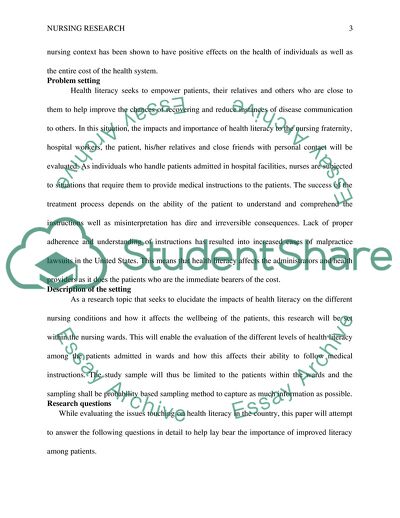
- Home
- Free Samples
- Premium Essays
- Editing Services
- Extra Tools
- Essay Writing Help
- About Us
- Studentshare
- Subjects
- Nursing
- The Medical Impacts of Low Health Literacy among the American Population
The Medical Impacts of Low Health Literacy among the American Population - Research Paper Example

- Subject: Nursing
- Type: Research Paper
- Level: Masters
- Pages: 22 (5500 words)
- Downloads: 0
- Author: sabbott
Extract of sample "The Medical Impacts of Low Health Literacy among the American Population"
Inadequate literacy among the American general population is attributed to poor management of chronic health conditions and this has significant impacts on the health outcomes. Health literacy influences the communication between the patient and the physician and any miscommunication because of illiteracy has serious implication on both the patient and the physician’s efforts. The lack of proper health literacy among patients has been attributed to a number of fatal mistakes committed by patients because of their personal ignorance.
The extent of health literacy and how personal education affects individuals’ ability to understand medical instructions has not been studied well and determined. According to (Baker, 2006), communication is essential for the effective delivery of health care and is considered as a powerful tool in the nursing fraternity. Mismatch between a nurse’s level of communication and a patient’s level of comprehension exist in most medical situations leading to high chances of misinterpretation of the information given to them by the nurses.
The lack of understanding between the two groups results into medication errors, missed appointments, increased cases of malpractice lawsuits and even adverse medical outcomes, which affect the life of the patient. Health literacy within the nursing context has been shown to have positive effects on the health of individuals as well as the entire cost of the health system. Health literacy seeks to empower patients, their relatives and others who are close to them to help improve the chances of recovering and reduce instances of disease communication to others.
In this situation, the impacts and importance of health literacy to the nursing fraternity, hospital workers, the patient, his/her relatives and close friends with personal contact will be evaluated.
...Download file to see next pages Read MoreCHECK THESE SAMPLES OF The Medical Impacts of Low Health Literacy among the American Population
Health Literacy and HIV Treatment Adherence
Financial Impact of the Underserved Population
Promoting Health Literacy for Children in Developing Countries
Health Literacy and Nursing
Community Health Needs and Services
The Health Challenges of African-Americans
Promoting Public Health Literacy
Health Literacy in Elderly Patients

- TERMS & CONDITIONS
- PRIVACY POLICY
- COOKIES POLICY